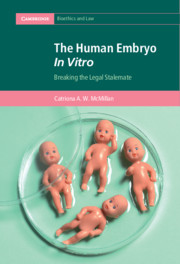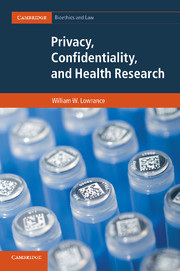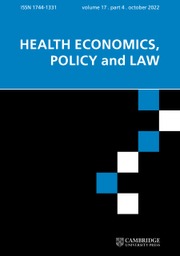The Human Embryo In Vitro
Breaking the Legal Stalemate
$130.00 (C)
Part of Cambridge Bioethics and Law
- Author: Catriona A. W. McMillan, University of Edinburgh
- Date Published: April 2021
- availability: Available
- format: Hardback
- isbn: 9781108844109
$
130.00
(C)
Hardback
Other available formats:
eBook
Looking for an examination copy?
If you are interested in the title for your course we can consider offering an examination copy. To register your interest please contact [email protected] providing details of the course you are teaching.
-
The Human Embryo in vitro explores the ways in which UK law engages with embryonic processes under the Human Fertilisation and Embryology Act 1990 (as amended), the intellectual basis of which has not been reconsidered for almost thirty years. McMillan argues that in regulating 'the embryo' – that is, a processual liminal entity in itself - the law is regulating for uncertainty. This book offers a fuller understanding of how complex biological processes of development and growth can be better aligned with a legal framework that purports to pay respect to the embryo while also allowing its destruction. To do so it employs an anthropological concept, liminality, which is itself concerned with revealing the dynamics of process. The implications of this for contemporary regulation of artificial reproduction are fully explored, and recommendations are offered for international regimes on how they can better align biological reality with social policy and law.
Read more- A historical account of the regulation of life before birth from the very first mention of 'embryo' in case law, to today's legal frameworks for in vitro embryos
- Explores the ways in which law has (historically and presently) engaged with the processual, rapidly evolving perspectives of the early stages of human life
- Written in a style that is understandable to those from various disciplinary backgrounds beyond law alone
Reviews & endorsements
‘Offering a strikingly fresh perspective on the regulation of human embryos, this valuable new book argues persuasively that the law’s attempt to ascribe a single fixed status to ‘the embryo’ is destined to fail, and that we should acknowledge instead the fluid, context-specific and essentially liminal nature of human embryos in vitro.’ Emily Jackson, Professor of Law, The London School of Economics and Political Science
See more reviews‘Using two innovative lenses - liminality and the gothic - in this book McMillan addresses the place and construction of ‘the embryo’ in law. Her penetrating socio-legal analysis draws on the science and technology studies and anthropological literatures to persuasively argue that there is no singular ‘embryo’ in law, but instead multiple (unacknowledged) ones. Her incisive analysis emphasises the significance of thresholds, boundaries, and processes for understanding law and legal gaps regarding these. She insists that it is ‘time to break the legal stalemate surrounding embryos in vitro’. The book is a call to arms - for both regulators and legal scholars - to take context and process seriously. Readers will be left in no doubt that this is a call we should all heed.’ Muireann Quigley, Professor of Law, Medicine, and Technology, Birmingham Law School
Customer reviews
Not yet reviewed
Be the first to review
Review was not posted due to profanity
×Product details
- Date Published: April 2021
- format: Hardback
- isbn: 9781108844109
- length: 224 pages
- dimensions: 160 x 235 x 20 mm
- weight: 0.5kg
- availability: Available
Table of Contents
Introduction
Part I. Into Liminality:
1. The evolution of 'the embryo' in law: a matter of process?
2. 'The embryo' in law today: the human fertilisation and embryology act 1990 and beyond
3. From process to purgatory: moving beyond legal stasis
Part II. Through Liminality:
4. Navigating legal purgatory: the otherness of embryos
5. A liminal lens
Part III. Out of liminality:
6. A context based approach
7. Looking forward: the 14-day rule, in vitro gametogenesis, and ectogenesis
Conclusion
Bibliography.
Sorry, this resource is locked
Please register or sign in to request access. If you are having problems accessing these resources please email [email protected]
Register Sign in» Proceed
You are now leaving the Cambridge University Press website. Your eBook purchase and download will be completed by our partner www.ebooks.com. Please see the permission section of the www.ebooks.com catalogue page for details of the print & copy limits on our eBooks.
Continue ×Are you sure you want to delete your account?
This cannot be undone.
Thank you for your feedback which will help us improve our service.
If you requested a response, we will make sure to get back to you shortly.
×





